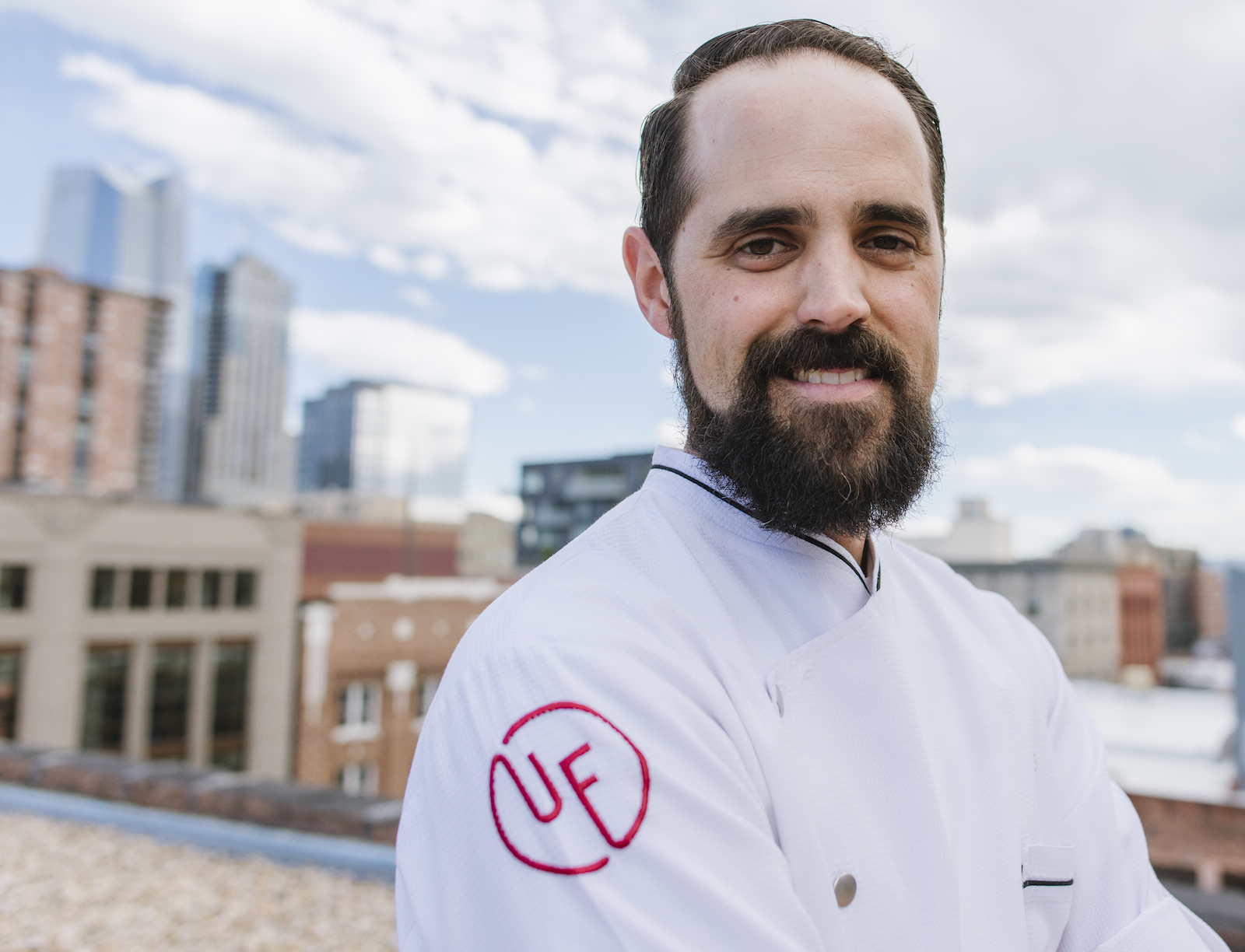The Local newsletter is your free, daily guide to life in Colorado. For locals, by locals.
When read carefully, a menu can tell a story. That’s certainly the case at Denver’s 11-month-old Urban Farmer. What looks to be a typical steak house lineup is peppered with nuances that spin the tale of executive chef Chris Starkus’ time under James Beard Award–winning chefs Wolfgang Puck and Alessandro Stratta in Las Vegas, his work at the flagship Urban Farmer in Portland, Oregon, his California upbringing, and even the influence of his grandparents.
Take Urban Farmer’s heirloom tomato and avocado salad, which is served with pickled wax beans, Cotija cheese, and crispy mustard seeds. The dish is a nod to his grandmother’s cucumber, tomato, and onion salad, which was always bathed in Wishbone Italian dressing. “It was salty, acidic, and refreshing,” Starkus says. “[The Urban Farmer] salad is more elevated but there are a lot of threads.” In fact, you could say the addition of the pickled wax beans (or the fava beans, watermelon radishes, and other seasonal veggies that appear across the menu) is a trifecta of provenance: They recall his childhood in agriculturally rich Southern California, his time in farm-to-table Portland, and his new venture as a true “urban farmer.”

It was Starkus’ green-thumbed grandfather who initially inspired him to try growing vegetables, but a gardening class, followed by the freedom to build rooftop beds on top of Portland’s Urban Farmer, unleashed a deep passion. Soon he was installing beehives next to the restaurant’s vegetables and buying chickens and bees to raise at home. “I love growing stuff and going out every morning and looking at it,” Starkus says.
Since moving to Denver in 2016 to open Urban Farmer in the Oxford Hotel, Starkus has transitioned from gardener to farmer. He, his wife Diana, and their two children work the quarter acre adjacent to their home in Lakewood. On that tiny plot, they grow lettuces, zucchini, beets, onions, tomatoes, peppers, squash, beans, melons, and edible flowers for both themselves and the surrounding community; some of the flowers go to Urban Farmer for garnishes and cocktails.
They’ve dubbed the land Lost Creek Micro Farm for the ripple of water that once ran through the area and irrigated the homesteads. Over time, the creek has been rerouted and covered to the point where it no longer exists beyond a single well. “When we were talking about names we wanted a story of place,” Starkus says. “This represents the stewardship of a quarter-acre and how precious that is in an urban area.” Last week, the Starkus family started selling its harvest (currently eggs, lettuces, and zucchini) from their farm stand. Look for it to pop up at 1940 Vance Street in Lakewood every Thursday from 3 to 8 p.m. In the meantime, read on for three things you didn’t know about Starkus.
Bonus: During Slow Food Nations this weekend, Starkus will sit on Sunday’s Buzz About Biodiversity panel, from 11 a.m. to 1:30 p.m. He and other national experts, including Colorado Springs’ grain scholar Nanna Meyer and Blackberry Farm’s master gardener John Coykendall, will discuss the delicate and interwoven stories of bees, seeds, and grains.
1. On the new “lemonade stand”… At the farm stand, we can sell eggs and vegetables, engage the community, and learn about business. We can ask people to come to the farm and give them access to fresh food while teaching our kids and ourselves and doing something for our neighborhood. My son’s friends help us weed and neighbors walk by at night and tell us ‘I come by everyday to see how things are going.’ We wanted to create access for the community.
2. On going back to basics… It was awesome to open and work at Alex at the Wynn [a now-closed two Michelin-star restaurant in Las Vegas], but there was no business acumen. It was well funded and the sole mission was to put out good food and get good reviews. But I wanted to understand the business… That’s when I went out to Oregon for a private chef gig. I was a private chef for two years for one family who had three homes. I was the chef and the estate manager and I ran the properties.
3. On learning… A lot of [urban farming] is just jumping in and doing it—trial and error and full immersion. That’s what they say about learning a new language, and that’s the way I learn best.








